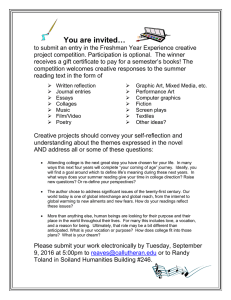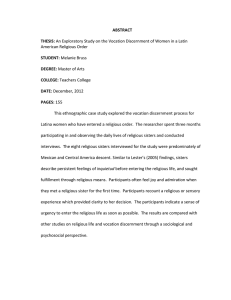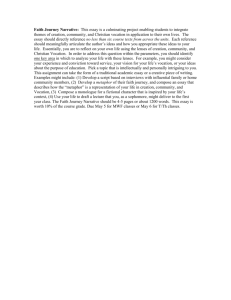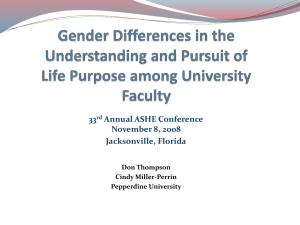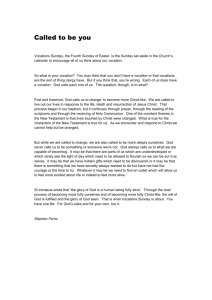Personal Stories of Faith Workshop Don Thompson & Cindy Miller-Perrin Pepperdine University
advertisement
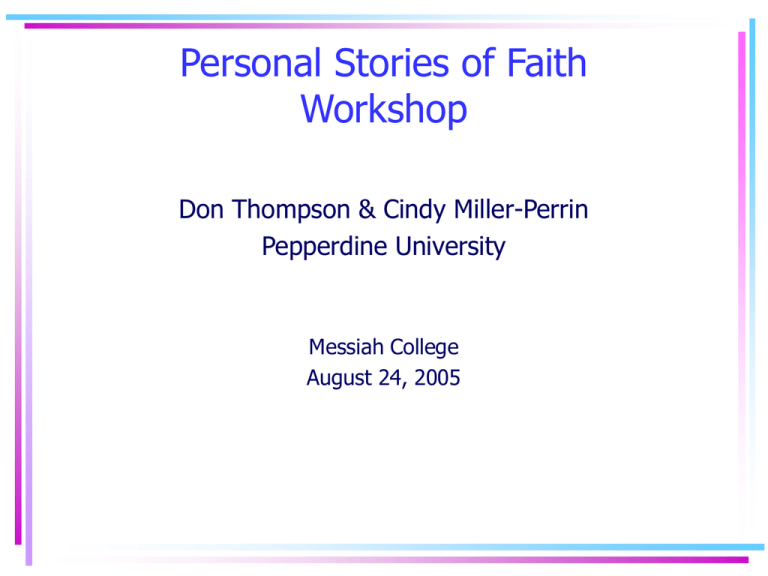
Personal Stories of Faith Workshop Don Thompson & Cindy Miller-Perrin Pepperdine University Messiah College August 24, 2005 Workshop Schedule • 9:00-10:30 • • • • • • • • 10:30-10:45 10:45-11:45 11:45-12:15 12:15-1:15 1:15-2:30 2:30-2:45 2:45-4:00 4:00-4:15 Summary of Vocation Survey Results Sharing of Stories – Part 1 Break Sharing of Stories – Part 2 Emerging Themes from Faculty Stories Lunch Vocation Definition Break Vocational Barriers Workshop Conclusion Faculty Survey on Vocation • The assessment included a 75-item survey – Definitions of vocation – Personal experiences of vocation – Barriers to vocational discernment and action – Sacrifices associated with living out one’s vocation The Faculty Sample • 34 faculty members completed the survey (100% response rate) • Mean age of participants: 48 years • Gender – 41% female; 59% male • Race – The majority of faculty participants are Caucasian • Religious Identification – The majority of faculty participants are Protestant Definition and Scope of Vocation Faculty Responses – Agree A Lot or Very Much • Vocation Refers To – Life purpose – 97% – God’s will for one’s life – 97% – Job/Career/Profession – 79% – Personal interests or skills – 64% – Formal ministry – 59% – Gender – 6% Definition and Scope of Vocation Faculty Responses – Agree A Lot or Very Much • Lifework Aspects of Vocation – Service toward others – 77% – Occupation/Career – 74% – Community – 74% – Church – 71% – Marriage – 68% – Parenthood – 65% – Friendship – 53% Personal Experiences of Vocation • I have a strong sense of my own personal vocation Somewhat A lot Very much 21% 32% 47% Personal Experiences of Vocation • My vocation includes serving those in need Somewhat A lot Very much 2% 35% 62% Personal Experiences of Vocation Faculty Responses – Agree A lot or Very Much • Personal sense of vocation develops from: – My personal interests – My sense of God’s will – Significant life experiences – The influence of others 94% 94% 88% 74% Barriers to Vocational Action Faculty Responses – Not At All • Demographic – 56%-82% • Personal Attitudes or Emotions – 38%-62% • Interpersonal Relationships – 44%-85% • Personal and Social Circumstances – 35%-85% • Personal Sacrifices – 18%-88% Personal Attitudes and Emotions as Barriers Faculty reported the presence of: (Faculty Responses – Ranging from Somewhat to Very Much) • • • • • Need for personal control (44%) Fear (39%) Selfishness (39%) Desire for certainty (36%) Being uncertain of own vocation (33%) Interpersonal Relationships as Barriers Faculty identified the following individuals: (Faculty Responses – Ranging from Somewhat to Very Much) • • • • • • Parent or other family member (24%) Supervisor/Boss (24%) Spouse (18%) Colleague (15%) Teacher or professor (12%) Mentor (12%) Personal and Social Circumstances as Barriers Faculty endorsed the following: (Faculty Responses – Ranging from Somewhat to Very Much) • Raising children (45%) • Concerns about supporting standard of living (36%) • Job-related responsibilities (36%) • Lack of financial resources (33%) • Other family responsibilities (27%) Vocational Sacrifices Faculty Responses – Agree A lot or Very Much • • • • • • Desired geographical location (42%) Salary (39%) Time with children (39%) Time with spouse (39%) Time with other family members (39%) Time with friends (24%) Personal Stories Vocational Definition • Our commission from God to identity, lifestyle, ministry, and service • Every decision, every relationship, every work • Discipleship in obedience to Jesus, becoming like Him • God’s will • The journey itself Personal Stories Vocational Discernment – Process • Intersection of talents, skills, desires and deep need for mankind • Gut feelings - innermost convictions • God’s loud voice speaking through tragedies, disappointments, losses • Ask and be asked questions • Through experience, trial and error, surprises - learn by doing Personal Stories Vocational Discernment – Evidence • When nothing else matters • Spiritual growth occurs • Deep sense of joy, satisfaction, contentment, peace, excitement, renewed energy • Positive feedback from others • Answered prayer Personal Stories Turning & Growth Points • Death of family member or close friend • Life’s mistakes & wrong turns • Education • Accepting Jesus • Conflict, tension, growing pains • Helping someone in need • Parenting Personal Stories Vocational Mentoring - Protégé • From Teachers, Professors & Colleagues • Through scripture & inspirational writing • Via spouse, parents, family members, church family & friends Personal Stories Vocational Mentoring - Mentor • Encourage, serve, support, lead, nudge, excite, energize, hear, listen, share inner lives • Understand vocation as journey • Find where deep gladness meets deep hunger • Learn about self, giftedness, passions, life purpose Personal Stories Vocational Obstacles • Pride & Self-Centeredness • Lack of faith • Lack of self-confidence • Struggle with traditional gender roles • Balance between home and profession • Health setbacks Personal Stories Vocational Obstacles (continued) • Prejudice • Family conflict, divorce, remarriage • Manager/supervisor as discourager • Sacrifice in distance from family & friendships • Heartaches, darkness, despair • Church culture Definition and Scope of Vocation • Secular View – Work, Career, Occupation • Christian View – “a holy calling” 2 Timothy 1:9 – Any human activity that gives meaning, purpose, and direction to life: lifework • Public and Private Dimensions – Work, ministry, community, relationships Definition and Scope of Vocation • “The place God calls you to is the place where your deep gladness and the world’s deep hunger meet” Buechner – Vocation involves loving and serving others – Vocation involves using the gifts God has bestowed upon us Vocational Definition Discussion Questions 1. a) How do you conceptualize “vocation”? b) In particular, how is vocation “not so much a call to ‘do’ as to ‘be’”? 2. How does your own faith tradition define calling? 3. How does your calling tie to your work with students? Vocational Barriers • Various barriers or obstacles may interfere with our ability to discern or act upon our vocational callings • Barriers serve as challenges that either – create struggles that we must overcome – create an impasse that redirects our journey Vocational Barriers • Personal Values, Beliefs, and Emotions – Secular views of vocation, fear • Cultural Values – Material success, competition, productivity • Personal and Psychological Needs – Security, control, certainty, power • Social and Interpersonal Circumstances – Finances, family responsibilities, stereotypes Vocational Barriers Discussion Questions 1. How do you conceptualize the notion of a “vocational barrier”? In what way is it a struggle to overcome vs. an impasse redirecting your journey? 2. a) Describe a barrier you have faced in pursuing God’s call. b) Describe a good thing that has come from dealing with this barrier. 3. What barriers are your students facing? Concluding Remarks • Comments about workshop experience – What was of most value to you? – What next steps will you pursue along your vocational journey? • Our insights from the workshop
